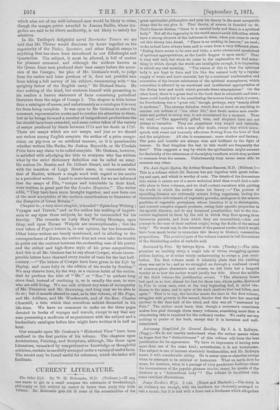CURRENT LITERATURE.
The Other Life. By W. H. Holcombe, M.D. (Triibner.)—If any one wants to get in a small compass the substance of SwedenborgSs philosophy on this subject he cannot do better than study this little volume. Dr. Holcombe gets rid of some of the eccentricities of the groat spiritualist philosopher, and puts his theory in the most acceptable shape that ho can give it. That theory, of course, is founded on St. Paul's famous dictum, " there is a natural body and there is a spiritual body." But all the ingenuity in the world cannot avoid diffoulties, which have a strong element of the ludicrous in them, when you come to carry out this theory into detail. " There is no cooking in heaven," we read cooks indeed have always been said to come from a very different place. "Eating there seems to be rare and little, a more ceremonial symbolical of spiritual appropriations, as the Lord's Supper is upon earth." That is very well said, but when we come to the explanation we find some- thing to which, though the words are intelligible enough, it is impossible. to attach any real meaning. "The reason of this is, that the spiritual body is not kept in form and life like the natural body by a regular supply of waste and inert material, but by a continual condensation and concretion of the inmost substances of the spiritual atmospheres, which concretion is effected by an emotional and intellectual appropriation of the divine love and truth which pervade these atmospheres." On the other hand, there is a great deal in the book that is admirable and true ; these could hardly fail to be, considering the source from which it comes, for Swedenborg was a "groat wit," though, perhaps, very "nearly allied to madness." The strange delusion which does as much as anything to confuse our notions of " the other life," that death makes men omnis- cient and perfect in every way, is not entertained for a moment. Thus we read :—" The apparently gifted, wise, and eloquent here are not always so hereafter. They are sometimes very stupid and imbecile. No wisdom remains with a man after death, except that which corre- sponds with sweet and heavenly affections flowing from the love of Goa and the neighbour. All else is evanescent ; mere shadow and fantasy. The pure and humble are always wise and brilliant in the light of heaven. In that kingdom the last in this world are frequently the first." This suggests a way by which the spiritualista might account for thefatuity of the utterances of the mighty intellects which they profess to summon from the unseen. Unfortunately they never seem able to summon any other.






























 Previous page
Previous page